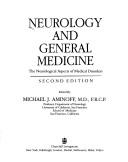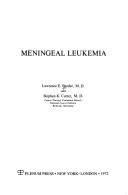Book
Year: 1970 Publisher: Paris: Maloine,
Abstract | Keywords | Export | Availability | Bookmark
 Loading...
Loading...Choose an application
- Reference Manager
- EndNote
- RefWorks (Direct export to RefWorks)
Muscular Diseases --- NEUROLOGIC MANIFESTATIONS --- ELECTROMYOGRAPHY
Book
ISBN: 0632000643 Year: 1980 Publisher: Oxford Blackwell
Abstract | Keywords | Export | Availability | Bookmark
 Loading...
Loading...Choose an application
- Reference Manager
- EndNote
- RefWorks (Direct export to RefWorks)
Hematologic Diseases --- Neurologic Manifestations --- complications
Book
ISBN: 1975118928 9781975118921 1975118936 9781975118938 9781975118914 197511891X Year: 2021 Publisher: Philadelphia, PA
Abstract | Keywords | Export | Availability | Bookmark
 Loading...
Loading...Choose an application
- Reference Manager
- EndNote
- RefWorks (Direct export to RefWorks)
Neuroophthalmology. --- Eye Diseases --- Neurologic Manifestations
Book
Abstract | Keywords | Export | Availability | Bookmark
 Loading...
Loading...Choose an application
- Reference Manager
- EndNote
- RefWorks (Direct export to RefWorks)
Hematologic Diseases --- Neurologic Manifestations --- complications

ISBN: 0443089337 Year: 1995 Publisher: New York Edinburgh London Churchill Livingstone
Abstract | Keywords | Export | Availability | Bookmark
 Loading...
Loading...Choose an application
- Reference Manager
- EndNote
- RefWorks (Direct export to RefWorks)
Book
ISBN: 2225858799 9782225858796 Year: 2000 Publisher: Paris: Masson,
Abstract | Keywords | Export | Availability | Bookmark
 Loading...
Loading...Choose an application
- Reference Manager
- EndNote
- RefWorks (Direct export to RefWorks)
Neuropsychology --- Neurologic Manifestations --- Nervous System Diseases
Book
Year: 2013 Publisher: Bruxelles: UCL. Faculté de pharmacie et des sciences biomédicales,
Abstract | Keywords | Export | Availability | Bookmark
 Loading...
Loading...Choose an application
- Reference Manager
- EndNote
- RefWorks (Direct export to RefWorks)
« Spice » is an herbal incense brand which is sold on the internet and in the headshops since a few years. Despite the indication "not for human consumption» appearing on the package, a lot of people are smoking its content to feel some effects like those caused by cannabis. Several synthetic cannabinoids such as JWH-018, HU-210 or CP 47, 497 are added to these herbal blends. Initially developed in a therapeutic aim, these molecules have high affinity for cannabinoid receptors. They are responsible for the psychoactive effect of Spice.Many cases of Spice intoxication have been reported since the arrival of these products on the market. Symptoms observed are: acute anxiety, agitation, restlessness, cardiovascular disorders, seizures and sometimes prolonged psychotic states. Frequency and severity of these side effects are much higher with Spice than with marijuana.Although little is known about the toxicity of these new drugs on the human body, assumptions may be formulated. Psychotic states could be explained by an alteration of the dopaminergic transmission in critical areas due to synthetic cannabinoids and by a potential interaction with the serotonergic system. Cardiovascular disorders and anxiety would come from an indirect sympathomimetic effect induced by these cannabinoids. It is also noticeable that it triggers cell death of neurons implicated in memory in many ways such as free radicals production. Seizures could be due to an alteration of the GABAergic and glutamatergic transmissions.Further toxicological researches would be most welcome to face up to the diverse consequences of this phenomenon. « Spice » est une marque d'herbes désodorisantes vendue sur internet et dans les « headshops » depuis quelques années. Malgré la mention « non destiné à la consommation humaine » apparaissant sur les sachets, de nombreuses personnes fument leur contenu pour ressentir des effets similaires au cannabis classique. Plusieurs cannabinoides de synthèse comme JWH-018, HU-210 ou encore CP 47,497 sont ajoutés à ces herbes. Ces molécules, initialement développées dans un but thérapeutique, possèdent une grande affinité pour les récepteurs cannabinoides. Elles sont responsables de l 'effet psychotrope des « Spice ».Une série de cas d'intoxication a été rapportée depuis l'arrivée sur le marché de cesproduits. On observe comme symptômes : une grande anxiété, de l'agitation, des troubles cardiovasculaires, des convulsions, des crises épileptiques et des états psychotiques parfois prolongés. La fréquence et la gravité des effets secondaires sont considérablement plus élevées avec les « Spice » qu'avec la marijuana.Malgré le manque d'information sur la toxicité de ces nouvelles drogues sur l'organisme, on peut formuler quelques hypothèses. Les moments psychotiques pourraient s'expliquer par une altération de la transmission dopaminergique et par une interaction potentielle avec le système sérotoninergique causé par les cannabinoides synthétiques. Les problèmes cardiovasculaires et d'anxiété proviendraient d'un effet sympathomimétique indirect induit par ces cannabinoides. On remarque également qu'ils provoquent la mort de neurones impliqués dans la mémoire via différents mécanismes comme la production de radicaux libres. Les crises épileptiques pourraient notamment être dues à une altération des transmissions GABAergique, glutamatergique, etc.Des études toxicologiques plus poussées seraient les bienvenues dans le but de faire face aux différentes conséquences de ce phénomène.
Cannabinoids --- Cannabis --- Substance-Related Disorders --- Neurologic Manifestations

ISBN: 0306305941 Year: 1972 Publisher: New York (N.Y.) : Plenum press,
Abstract | Keywords | Export | Availability | Bookmark
 Loading...
Loading...Choose an application
- Reference Manager
- EndNote
- RefWorks (Direct export to RefWorks)
Leukemia. --- Neurologic manifestations of general diseases.
Book
Year: 1976 Publisher: London Chapman and Hall
Abstract | Keywords | Export | Availability | Bookmark
 Loading...
Loading...Choose an application
- Reference Manager
- EndNote
- RefWorks (Direct export to RefWorks)
Eye Diseases --- Eye Manifestations --- Neurologic Manifestations --- complications
Book
Year: 1969 Publisher: New York (N.Y.): Oxford university press
Abstract | Keywords | Export | Availability | Bookmark
 Loading...
Loading...Choose an application
- Reference Manager
- EndNote
- RefWorks (Direct export to RefWorks)
Nervous System --- Neurologic Manifestations --- anatomy & histology

 Search
Search Feedback
Feedback About UniCat
About UniCat  Help
Help News
News